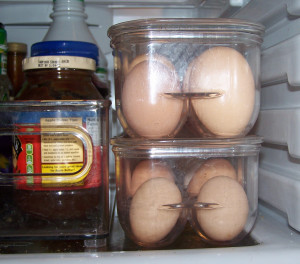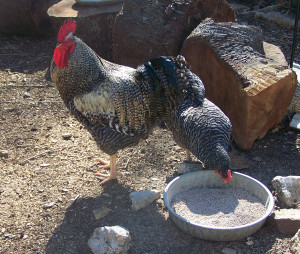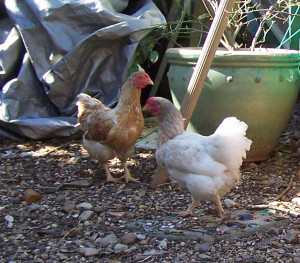Keeping chickens for eggs is the one bit of home economy that we never did, growing up, although we could have done so quite easily. Mom was adamantly opposed to doing so, as Granny Jessie had done so all during the Depression and probably up through WWII. Mom did not like chickens, thought they were smelly, ugly and inclined to be vicious – roosters especially have a talent for aggression, which is their purpose in life. They are there to protect the flock, and to ensure continuance of the chicken tribe, of course. Mom continued to buy eggs from the supermarket, or from a local outlet in Valley Center. Which smelt comprehensively, and could be detected at some distance, especially when the wind was in the right quarter, so Mom did have that part correct.
But the Daughter Unit and I entered on the prospect of keeping chickens for eggs with an open mind, aided by the fact that doing so seems to have become rather fashionable lately. Rumors of epidemics among commercial egg-producers two years ago, the fact that eggs seemed to be getting pricier … well, it made sense to establish at least some small degree of food independence. When a price of a small coop and run at Sam’s Club was slashed in half, it seemed to us that it was the right time. So – coop assembled, an enclosure in the yard set aside for it, and off we went to a local supplier for three pullets; as the Daughter Unit called them, the Three Chicken Stooges. She wanted to name them Larry, Moe and Curley, but since they were supposed to be females, I said they would have to be Loreena, Maureen and Carly. As it turned out, sexing Barred Rock chicks is not an exact science; Loreena turned out to be a Larry after all; Larry Bird. For a rooster he is pretty mellow – also pretty quiet, compared to some roosters that we have heard tales of from other back-yard chicken fanciers. Even so, I threaten to post the recipe for coq au vin prominently in the coop, as a warning to Larry.
Maureen and Carly lay pretty consistently – an egg every day, or at least, every other day. They did not lay for a couple of weeks last fall when they were molting, but their feathers all grew back magnificently. The whole project was such a success, overall, that the Daughter Unit became ambitious; knowing that Maureen and Carly would eventually age out of egg-laying, she proposed that we acquire some younger hens. One of the other back-yard chicken fanciers in the neighborhood had a pair of Wyandotte pullets extraneous to needs, so we paid her for the two, named them Winona and Dottie and added them to the menagerie. Unfortunately, Winona and Dottie were at the very bottom of the established pecking order. Several mornings later, the Daughter Unit found them with their heads pecked raw and bloody – she was half-afraid that
Dottie wouldn’t survive. We had to segregate the Wyandottes in their own section of yard, and purchase another small coop for them to stay in at night. They survived, thrived and began laying … and only then, when they hadn’t gotten much larger, we realized they must be bantam Wyandottes; about a third the size of Maureen and Carly. Their eggs are tiny; the size of a Cadbury’s chocolate egg. Handy, when it comes to halving a recipe that calls for an odd number of eggs. The big chickens and the little chickens do not mingle; they leave each other pretty much alone.
All in all, we are quite happy with the flock. Well, Larry Bird tends to tune up at 5ish, many mornings, but I don’t mind it too much. Our neighbor on one side works nights, the neighbor on the other has her bedrooms at the far side of the house – and she rather likes the sound of them coming and going about their chicken-things. We give away a fair portion of the eggs anyway, in exchange for general goodwill, for venison from one neighbor who is a bow-hunter, and another for vegetables – she is a more successful gardener than I am.



